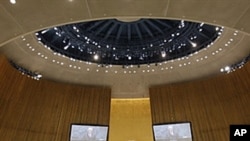The U.N. General Assembly has condemned human rights violations in Iran, particularly those that have occurred since last June's disputed presidential election, when thousands of opposition supporters were arrested and detained.
In a vote of 74 in favor, 48 against and 59 abstentions, the General Assembly committee responsible for social, humanitarian and cultural affairs - known as the Third Committee -adopted the resolution co-sponsored by Canada and 41 other countries.
For the last seven years, the assembly has adopted a similar resolution criticizing human rights violations in Iran. But this year, in addition to expressing concern over on-going abuses, the resolution noted with particular concern violations that have taken place since the disputed June presidential election that returned President Mahmoud Ahmadinejad to office.
After the vote, thousands of people were detained during street protests led by opposition supporters who claim President Ahmadinejad's victory was rigged. More than a 100 activists were tried on charges of inciting unrest and plotting to overthrow the government. This week Iranian state television reported that five people had been sentenced to death and another 81 were sentenced to up to 15 years in jail.
Canadian Ambassador John McNee said Iran has consistently failed to live up to its international human rights obligations.
"These failings were made only all the more evident following the June 12 presidential election, when the use of force by Iranian security forces resulted in the death, injury and arrest of many individuals; when many of those who were detained were subjected to torture and denied access to legal representation; when freedom of association, assembly and expression were drastically curtailed," he said.
He added that as long as such serious violations continue, the General Assembly must encourage positive change.
The resolution also noted the increase in the number of executions following the election and condemned the general use of the death penalty in Iran, especially when applied to minors.
The body called on the Iranian government to launch a "credible, impartial and independent investigation into the allegations of post-Presidential election human rights violations," and to end other abuses including stoning, flogging, amputations and public executions.
Iran's U.N. Ambassador, Mohammad Khazaee, denounced the resolution as "politically charged and motivated" and full of false claims.
"Abusing the U.N. human rights mechanisms for short sighted political experiences reduces the highly valued concept of human rights into a tool of foreign policy for certain countries. This has created an atmosphere of confrontation and polarization which would only erode the capacity of the United Nations for the meaningful promotion of human rights," he said.
Many of the member states that abstained or cast "no" votes said they are opposed to resolutions that single out specific countries for censure. Others said they believe the right place for discussing human rights is in Geneva at the Human Rights Council.
The resolution must now be approved at a plenary session of the 192-member world body where its adoption is virtually assured.
News
UN General Assembly Condemns Post-Election Abuses in Iran
update

In a vote of 74 in favor, 48 against and 59 abstentions, the General Assembly committee responsible for social, humanitarian and cultural affairs - known as the Third Committee -adopted the resolution co-sponsored by Canada and 41 other countries.



